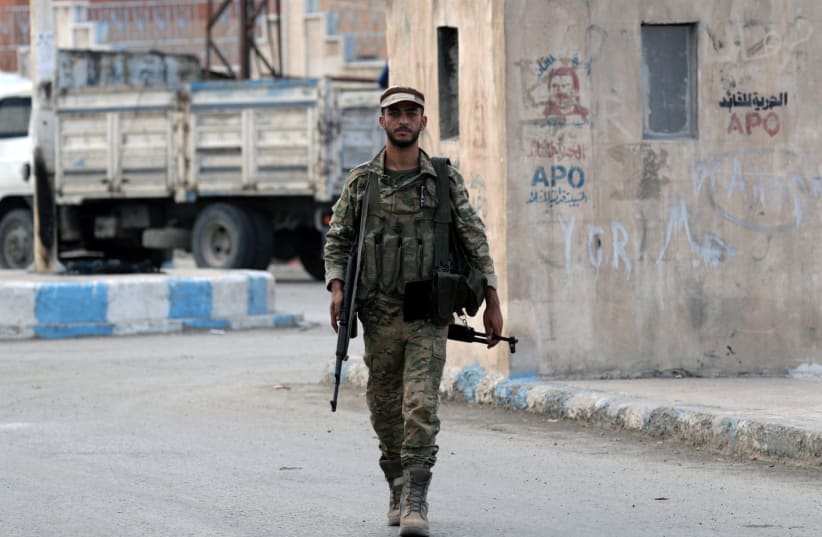After Ankara’s October offensive, in which some 200,000 people were forced to flee, Ankara signed a deal with the Tripoli-based government in Libya to help Tripoli fight opposition groups and secure Turkey’s energy demands in the Mediterranean.Ankara then shipped thousands of Syrians to Libya to fight and sent drones to hammer the Benghazi-based Libyan National Army. In December and January, Turkey was busy heating up the Libya conflict, before moving on to stoke tensions with Russia and the Syrian regime in Idlib. Ankara threatened to send Syrian refugees to Europe during the Idlib crises of February and March.In April and May, Turkey returned to fighting in Libya, capturing a key military base at Watiya. Then the Ankara regime of Recep Tayyip Erdogan decided to increase Turkey’s airstrikes in Iraq, claiming to begin fighting the “Kurdistan Workers Party,” known as the PKK.I understand @potus is consumed with many important issues at home, but looking the other way while Turkey commits humanitarian atrocities in NE Syria and Iraq is not acceptable. https://t.co/Q40oyGtdeB
— Rick Santorum (@RickSantorum) June 28, 2020
On June 17, Turkey launched airstrikes against Yazidi areas of Sinjar and near Christian villages along the border, forcing Kurds to flee the battles. Iraq has expressed increasing concern about the attacks, which appear to be coordinated with Iran.Turkey has used the excuse of “fighting the PKK” to invade northern Iraq and Syria, taking over Afrin, Jarabulus and Tel Abyad, as well as to establish more than a dozen military bases.Turkey and the PKK once had a ceasefire before 2015, but it broke down.Since then, Turkey has claimed it has a right to bomb anywhere that members off groups linked to the PKK exist. This includes bombing unarmed people who are members of far-left groups that Turkey labels “PKK.” Turkey has produced no information that these groups are involved in armed attacks on Turkey this year.Iraqi Security Media Cell condemns Turkey's attacks in the Kurdistan Region violating Iraq's sovereignty. https://t.co/4LjIDRB4GA
— Nawroz Sinjari (@RojuAv) June 16, 2020
The bombings in Iraq have created tensions with Arab states, including the Gulf which opposes Turkey’s actions. This is linked to the wider regional rivalry between Saudi Arabia and Turkey.Ankara says it expects Iraq’s cooperation. Iraq has internal troubles with ISIS insurgents and disputes between the US and Iran, as well as Iranian-backed militias mobilized across the country.This means Iraq is so divided it has trouble opposing, even diplomatically, Turkey’s actions. A variety of Iraqi officials have nevertheless spoken up about the increasing war in northern Iraq.The conflict has also increased tensions in other countries. For instance far-left Kurdish demonstrators in Vienna were attacked by pro-Turkish far-right extremists linked to a group called “Grey Wolves.” Vienna police had to intervene.The conflict in northern Iraq has divided Kurdish groups as well, with some arguing that the autonomous Kurdistan Regional Government should do more to protest Turkey’s actions. But the Kurdish government in Erbil knows it has little choice because it has seen Turkey roll over Afrin and even push the US out of parts of Syria.With US policy in parts of the Middle East determined primarily by Ankara’s demands on Washington and pro-Turkey members of the US State Department, vulnerable political groups in Iraq have little say.While some US voices have expressed concern, including a tweet by the State Department after three women were killed in a Turkish air strike in Syria, most remain silent. Representative Jim Cooper from Nashville tweeted over the weekend that he was extremely disturbed by reports of “Turkish military attack on Kurdish people in Iraq.”Voices at the US Commission on International Religious Freedom have also expressed concern and called for an end to the attacks.I am extremely disturbed by reports of Turkish military attacks on Kurdish people in Iraq. The Kurds have been a reliable U.S. partner in the fight against ISIS, and any violence against civilians by President Erdogan must be condemned.
— Jim Cooper (@repjimcooper) June 26, 2020
